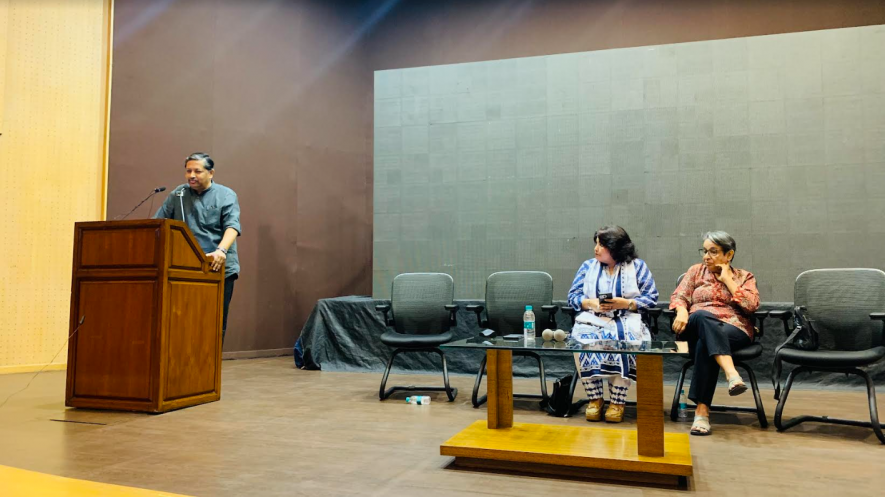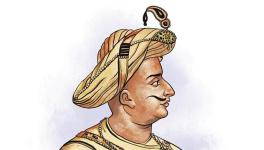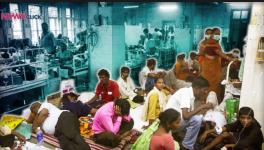Secularism is not Anti-Hindu, say Activists at DOSTI Convention

Hundreds of activists, teachers, students and civil society members participated in the convention organised by the Democratic Outreach for Secular Transformation of India (DOSTI) at Jawahar Bhawan on Saturday evening to discuss the assault on press freedom, judiciary and education. DOSTI is an initiative by civil society groups to strengthen secular values in public life. The convention had three sessions moderated by noted scholar Sheeba Aslam Fehmi.
Shahrukh Alam, Senior Advocate, Supreme Court of India, said that the contradiction between Constitutional law and Criminal law is one of the central problems that need to be addressed today if we are interested in tackling social disharmony.
"Our constitution talks about fraternity, whereas Criminal law sees hate speech as a law and order issue. Had it taken a constitutional angle, it would have seen hate speech rooted in discrimination and a breach of constitutional promise."
She added that we further see dissonance in the case of arrest as it is generally presumed in common law systems that a person's arrest would occur at the end of the investigation.
"It is the exact opposite in our country that arrest would be the beginning of the investigation. It has a colonial legacy that the investigator would beat people black and blue and rely on that it would bring out the truth."
She added, "What is more painful is that it has not changed after independence. Let me cite the examples of Scotland, England and India. In Scotland, a person can be put under detention for six hours without any charges. It extends to 7 days in England if there are charges of terrorism. In India, it is six months. Unfortunately, the opposition party brought draconian laws like the Unlawful Activities Prevention Act (UAPA) and then Law Minister said it was a gift to the security forces. Now, we all are seeing the consequences."
Echoing similar sentiments, Prashant Bhushan, Senior Advocate, Supreme Court of India, said that the attack on media must be seen in the context of decreasing popularity of traditional media outlets towing the government's narrative.
"Unfortunately, a similar trend exists in the judiciary, where post-retirement considerations affect pre-retirement judgements."
Addressing a session on press freedom, senior journalist Arfa Khanum Sherwani said that there would be global consequences if majoritarian politics crush the secular credentials of the nation.
She said, "If India goes down, it would take the world with it. We are not a small country of a few million people. The world looks up to us for pluralism and democracy. However, we must understand that the words like liberalism, democracy, secularism and even constitution have been demonised. Rashtriya Swayamsewak Sangh and its affiliates have invested a lot of time and energy in the smear campaign and largely made people understand that secularism is essentially anti-Hindu. So there has to be a sustained campaign to redefine these words."
She added that the people of the different communities must be made to realise that secularism helps families and communities build stronger relations.
"In India, religious minorities like the word secularism because it gives them protection. However, the attitude changes as soon as power shifts to them in other countries, be it Muslims, Christians and Jews. Since Hindus are being mobilised and constitute the largest chunk of electorates, they must realise that secularism is meant for their personal and familial benefits. In the West, people associate themselves with rights, constitution and press freedom, which is very much personal."
She added that casual Islamophobia is evident in the press coverage of incidents, and Israel's murderous attacks on Palestine are the latest example.
She said, "I felt a déjà vu moment when I heard the news of three Muslim American journalists retrenched because they were not expected to be neutral and objective in the war coverage. I was too removed from my reporting assignment 15 years ago when I was covering the Batla House encounter, and I was the first video journalist to reach the spot. Yet, I was called a member of the banned organisation SIMI in a newsroom which was considered secular. This casual Islamophobia prohibits serious discussion, and we must comprehend ways to take people together."
Mandeep Punia, the founder of Gaon Savera, said it would be wrong to presume that the latest assault on NewsClick emanates from a conservative thought process.
"It is worth revisiting the statement of S Jaishankar on the visit of US Secretary of State Antony Blinken, where a journalist asked him about civic liberties in Kashmir, and Jaishankar had no issues in inferring that civic liberties could be comprised for good administration. Similarly, National Security Advisor Ajit Doval had said that civil society is a dangerous entity."
He added, "I agree that a parallel social media network has come up, and it is successfully challenging the narratives of the government. In some cases, it is more popular than traditional media. However, the movements are at the forefront of this fight. It was quite visible in Nuh when farmers bodies built pressure and social institutions like Khap had to take the position that they will not be a party to communal violence."
Surajit Majumdar, Professor at Centre for Economic Studies and Planning, Jawaharlal Nehru University, said that there is an impact on higher education in the country, too, when RSS-BJP is injecting communal venom in the country. He said that there are two broader contradictory trends.
He said, "The participation of the young population in higher education has jumped from 8% to 27% in the last three decades, and it is generally those groups which did not have access to education earlier, like girls, dalits and adivasis. The gross enrolment ratio of girls is higher than that of boys in higher education. The participation of SCs, STs and OBCs also matches their population. The Muslim community is still lagging. So, how did this happen even when government spending has remained flat in the last two decades? Families realise that only good jobs offering handsome perks are the route towards prosperity."
This feeling is quite dominant among families with less property, which is why they spend beyond their capacity to educate their children, Majumdar added.
"So, the private education sector is also flourishing. However, minimal jobs exist in the existing development process, creating a politically explosive situation when people ask questions about jobs and growth."
Majumdar talked about the private capital's focus on skill-based education.
"Since higher education institutions are autonomous, the ruling parties have used institutions like UGC to advise universities on curriculum. Similarly, Vice-chancellors are appointed to ensure that administrative structure suits them and teachers appointed are close to RSS and its affiliates."
Madhu Prasad, a Retired Professor from Delhi University, said that the school education is less talked about, but it is being attacked, too.
"The education should include the experiences of children in understanding the world around them. Unfortunately, the new education policy takes every student at par as far as learning level is concerned. It prescribes a national test in the fifth class to determine if they should go beyond. I think it's a travesty."
Get the latest reports & analysis with people's perspective on Protests, movements & deep analytical videos, discussions of the current affairs in your Telegram app. Subscribe to NewsClick's Telegram channel & get Real-Time updates on stories, as they get published on our website.
























